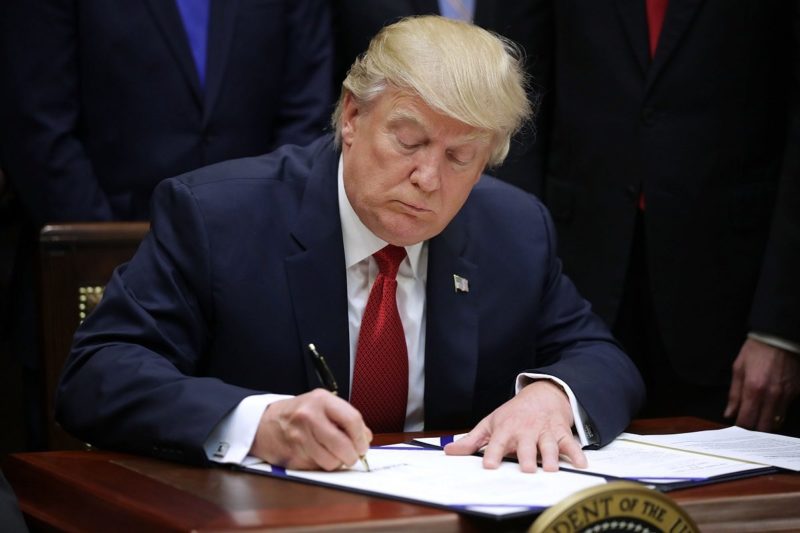Trump’s First 100 Days: A Blueprint to Hurt People of Color
Trump’s budget proposal amounts to an obscene redistribution of resources from the working poor to the wealthiest.

Every day, as I work alongside community leaders to secure health and justice for Latinas, I am stunned by this White House’s ever-growing hostility toward communities of color. The Trump administration sees the country’s changing demographics—the rising number of nonwhite and foreign-born people—as the chief internal threat.
In this administration’s first 100 days, the document that most reflects that prejudice is its budget blueprint. It outlines President Trump’s spending priorities and program cuts that make clear his utter contempt for communities of color, and it edges this country and its moral compass closer to the nativist vision espoused by the likes of White House advisers Steve Bannon and Stephen Miller, and Attorney General Jeff Sessions.
People of color would be disproportionately affected by Trump’s proposed elimination of critical programs that help pregnant women, children, and the poor. They would be hurt by disastrous cuts to economic programs that help workers and families. Latinas face the largest wage disparities among all racial and ethnic groups, with a recent study showing that Latinas must work 22 months to make what white men earn in 12 months. And because women of color and immigrant women disproportionately work in physically demanding and low-wage jobs that offer little flexibility, they are most affected by regressive wage legislation.
The racist subtext of Trump’s budget is seen in his spending priorities: a $2 billion down payment to begin construction of a wall on the U.S.-Mexico border and funding for 100 new government lawyers to handle the expedited removal of undocumented immigrants, 500 new Border Patrol agents and 1,000 new Immigration and Customs Enforcement personnel.
The price tag to pay for the building of detention facilities designed to hold undocumented immigrants and fund their removal is a whopping $1.5 billion. These proposals align with such Trump strategies as publishing crimes committed by undocumented immigrants, though these reports were recently suspended after protests by civil rights advocates. The racial implications of such strategies are clear, as most crimes are not committed by immigrants. The budget is just another prong in a racist agenda that posits nonwhite people as a drain on public resources and a threat to the national racial order.
None of this is a surprise; Trump’s racism has been well-documented. On the first day of his campaign, Trump said of Mexican immigrants, “They’re bringing drugs. They’re bringing crime. They’re rapists.” Upon taking office, he issued multiple executive orders regarding immigration, threatened to defund so-called “sanctuary cities,” and called for the creation of detention centers to hold Central American refugees—mostly women, children, and LGBTQ people seeking to escape violence in their homelands.
Trump’s budget amounts to an obscene redistribution of money and resources from the working poor—of whom a disproportionate amount are people of color, including immigrants—to the wealthiest. In order to fund the criminalization and persecution of immigrants, Trump proposes stripping those very communities of the support they rely on to thrive.
As we approach the end of Trump’s first 100 days in office on April 30, I ask that we center around the perspectives and needs of the courageous women I encounter in my work every day. They toil and struggle against sizable odds to provide for their families in low wage, demanding jobs that pay them little; they jump through hurdles to find child care, obtain routine health services, and ensure their family’s safety. They are the backbone of their families and community, and they want to contribute to a better and more just society. In this era of Trump, these women are fighting the threat of having their families torn apart through needless deportations and are working through the pain of having to explain to their children their family’s plan in case they are separated. These courageous women are speaking truth to power, even in the face of sexism, racism, and xenophobia.
Reproductive justice cannot be attained without racial equality, without quality affordable health care, without humane and just immigration reform, and without LGBTQ liberation. The Trump agenda requires us to focus on the role race and immigration status play in injustice, even legalized injustice. We owe it to our communities to help lead the way in calling out this administration’s actions for what they are: part of a racist agenda that seeks to exclude communities of color while using immigrants as scapegoats to score political points with the vocal minority of nativists in our country. Trump’s proposed budget is an attack on all of us, and we will not sit idly by.

